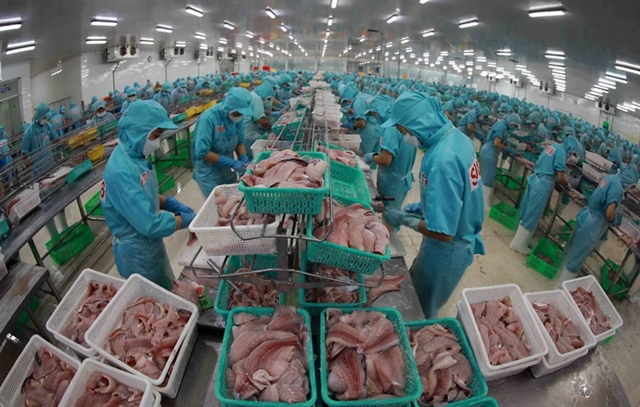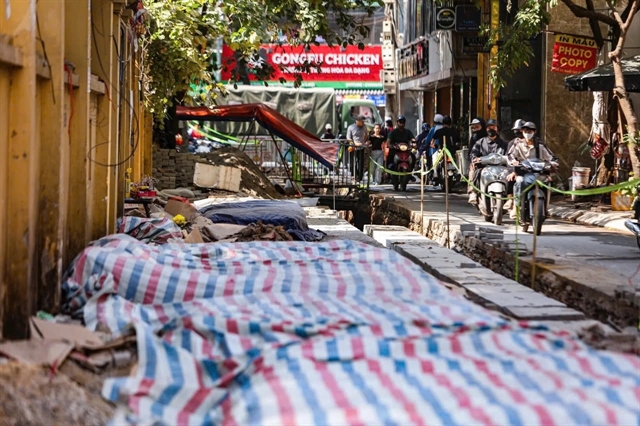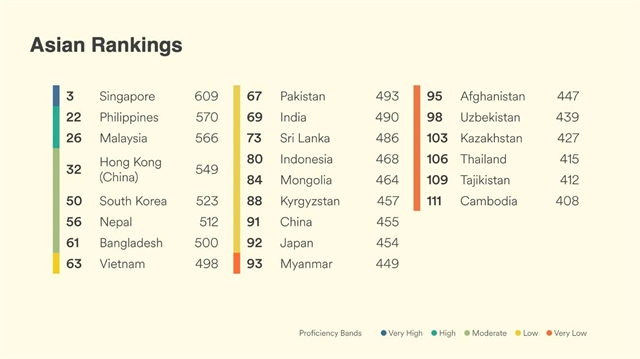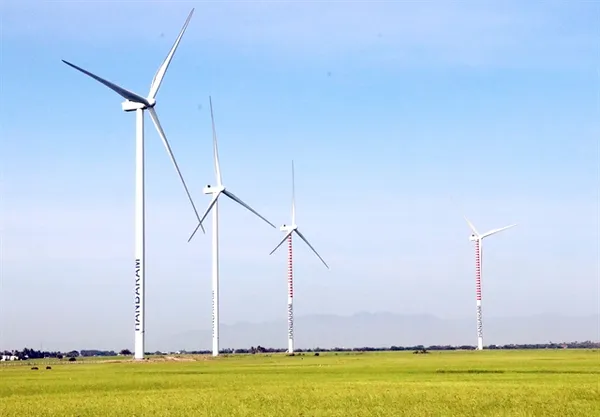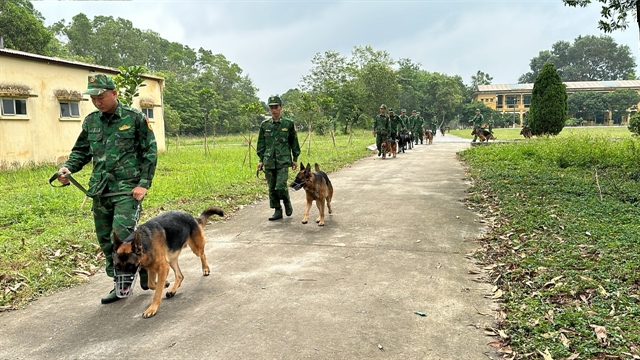 Features
Features

A community garden in Điện Bàn Town in Quảng Nam Province is using a new farming model to raise awareness about how organic gardens benefit people and the world around them.
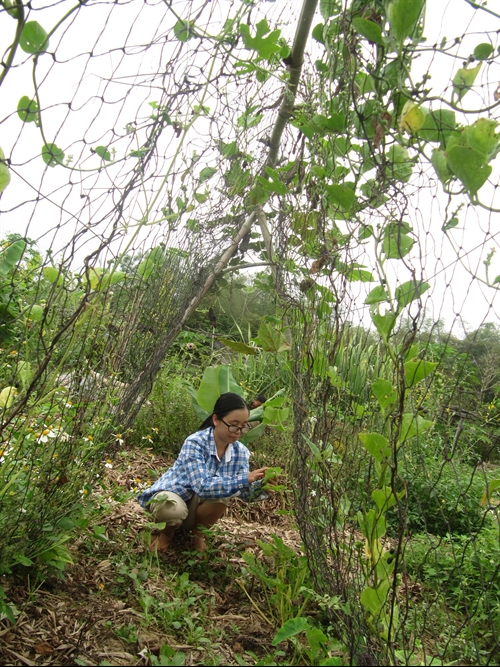 |
| All natural: Nguyễn Thị Hà takes care of a bean trellis on the organic farm. The garden grows plants and vegetables in an organic style, not using chemical fertilisers or pesticides. — VNS Photo Công Thành |
by Công Thành
Organic gardening is a traditional, healthy style of farming known to most Vietnamese people for centuries. However, the old style is fading in the modern day, as farmers keep rushing with rapid changes of habit of consumers in the market to increase their profit. As the number of cancer patients rises in hospitals and food is seen as a contributing factor, consumers and farmers think of the old, safe, environmentally friendly farming styles. Urban residents now prefer growing their own vegetables in plastic boxes on their balconies or roofs to provide themselves chemical-free vegetables. A community garden in Điện Bàn town in Quảng Nam Province has developed an organic farm model to help raise awareness in its community about the importance of safe, healthy food and environmental protection.
Vũ Thị Mỹ Hạnh, 29, from Hà Nội, and a group of volunteers work on a 600sq.m garden in a small village in Điện Bàn town. They are trying to revive an old style of farming linked to their Vietnamese ancestors.
Hạnh, who manages the Green Youth Collective project, said the garden village on the Thu Bồn River was an example of native-friendly gardening for young people and farmers who want a healthy future.
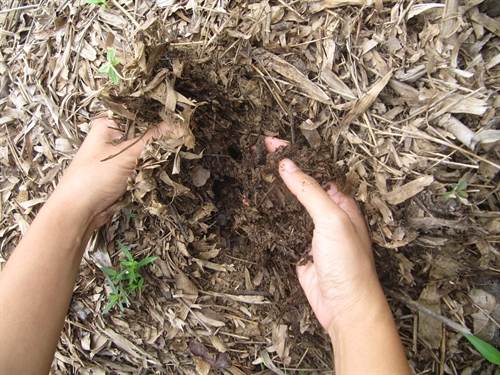 |
| Solid foundation: A mixture of chopped banana trunk and green leaves is used to fertilise plants and vegetables in an organic farm in Dien Ban Town, near Hoi An Province. — VNS Photo Công Thành |
Hạnh allocated a 600sq.m farm to build a mock-up of a natural jungle garden that could be replicated.
“Farmers no longer practise as their ancestors did in gardens and paddies. They rush for profit and productivity, but don’t care about the environment or health of the community. Chemical ingredients in pesticides, weed killers and fertilisers are often over-used for maximum harvest in a short amount of time,” Hạnh said. “We are trying to build up a demonstration to introduce gentle gardening skills to improve the soil, underground water and love of working among young people and local farmers.”
The garden was grown on a jungle-based structure, in which soil is kept as a basement while layers of ‘green fertiliser’ provide nutrition for the plants.
Rubbish, leaves, rice straw, kitchen-ash and cow manure are processed for compost.
Hạnh, who is known as Stoney Chenal on Facebook, said a good natural habitat was formed in the garden, with peaceful coexistence among insects, flowers and plants.
“Creepers can grow along with beans, as it keeps the slight plant braced against wind during a storm, while bushes and herbs create a cool and moist cover for soil and roots, as well as earthworms,” she explained. “Flowers are grown in the garden not only for colourful decoration, but because they lure bees, ants and beetles – which protect the plants from harmful insects.”
The Hanoian project managers said the nature-based garden opened the door for all youths who wish to have a green future and develop healthy life skills.
She said the garden helped educate people on sustainable gardening practices that focus on building up the soil, cover-cropping, companion planting and working with local plants. There were also community workshops, and individual and group projects.
Hạnh said seeds were collected every harvest and stored for the next crop.
Volunteers
Nguyễn Thị Hà, 22, a final-year student at Huế Science and Humanitarian College, said the organic farm lured her with its practical gardening tips and opportunities for studying for her environmental thesis.
Hà, from Điện An Commune of Quảng Nam Province, said the organic farming would help her experience more sustainable farming in her homeland.
“I learn skills of ancient gardening from volunteers working at the project, and I found that it’s really a healthy production not only for people, but for the environment,” Hà said. “Pollution, over-use of chemical fertilizers and pesticides in agriculture has gradually poisoned lifestyles in peaceful rural areas. Urban residents are now suspicious of farm produce in the market, as they are not sure which is safe.”
“Much talk in urban areas just focuses on safety food and organic gardening,” Hà said. “Urban residents only believe food is safe from what they see at organic farms in rural villages.”
The 22-year-old student said some farmers cheat consumers by saying food is safe but still use pesticides.
Piangruethai Kiatchonnavi, also known as BPhu, an English teacher from Thailand who joined the project as a volunteer for the past seven months, said she found organic farming interesting.
“I retired from teaching in Thailand as I found it stressful,” Piangruethai said. “I have traveled Southeast Asian countries to practise gardening. I really want to raise awareness about organic gardening for better health and environment.
“If I demonstrate the old way of gardening, local people will come to know our way and they will understand. We’ll provide free training for them and they will learn about sustainable production from the organic farm.”
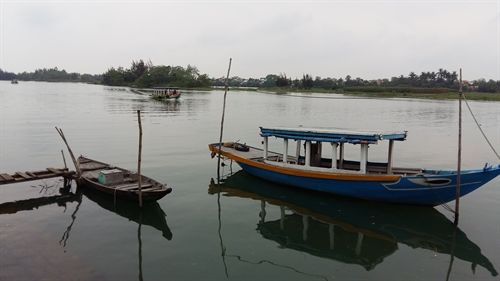 |
| Wide open spaces: Boats carry tourists along the Thu Bồn River in Quảng Nam Province. — VNS Photo Công Thành |
Hà, who is the youngest in her family of four siblings, didn’t do any gardening as a child. But in her adult life she’s learned to love organic farming. She even uses a natural pesticide made with garlic, ginger, chilli and rice wine.
“Organic gardening reminds me of my childhood, when I witnessed my parents working on their garden and rice farm the natural way,” she said.
She said she has been studying the productivity of organic and chemical-based farming.
“I just test plots of vegetables,” she said. “I initially found that vegetables from organic plots grow better. It’s because plants are nourished from ‘green nutrition’, while in chemical farming the fertility of the soil is damaged.”
Hà said that she had not yet analysed the natural composition of the soil being used at organic farms in comparison with soil at pesticide- and chemical-using farms.
Changing minds
Vũ Đức Sinh, deputy chairman of the Triêm Tây village farming co-operative, said the Green Youth Collective project brought about big changes for local farmers.
“Safety and chemical free farming has been a favourite of local people in the village in recent years,” Sinh said. Buyers are becoming more aware of the dangers of food with chemicals in it.
“Our ancestors made fertiliser from green leaves and cattle dung. It’s about coexistence between people and nature.”
Sinh said nearly 50 per cent of the village had been educated about organic farming, but more change was still needed.
“Local farmers thought the new process would waste their time with little results, but they have not yet recognised the importance of the environment, and clean and healthy food,” he said.
| ||
Sinh added that he has been seeking financial support from the International Labour Organisation (ILO) and UNESCO to build the village into a clean, healthy farming area.
“I myself join in on communication campaigns about organic farming,” he said. “We have been encouraging local people not to use plastic bags, and to sort their rubbish and recycle.
“It’s a long education course, but we hope for a better future. I often persuade local farmers that organic farming and environmentally friendly methods will create a better future for our children. I told them that if you want to live longer, you should have an environment with fresh air, and chemical-free, safe food.”
Nguyễn Thị Biên, 61, a villager, said she also farmed on a 500sq.m garden to collect vegetables for her family.
“I just do not use toxic pesticides, but chemical fertiliser is still used,” Biên said. “I know the organic method from the project, but it’s still very strange for us. We rarely change.”
“It’s prolonged habit of local farmers, and we need an actual bumper harvest from organic farming as well as better change of environment,” she said.
Hà said she would return to her homeland with organic farming skills to develop more clean, green gardens for her community.
“I wish to build a ‘green and clean’ brand of vegetable and farm produce from my village,” she said. “It’s our community goal that we could do all this with our passion and our love for nature.”
Sinh said he hoped organic farms would attract tourists from Hội An on the other side of Thu Bồn River, as Cẩm Kim Bridge conveniently connects the ancient city with the rural village.
Hạnh, the manager of the Green Youth Collective project, said it would also host a training course on organic farming for underprivileged youth this summer. – VNS
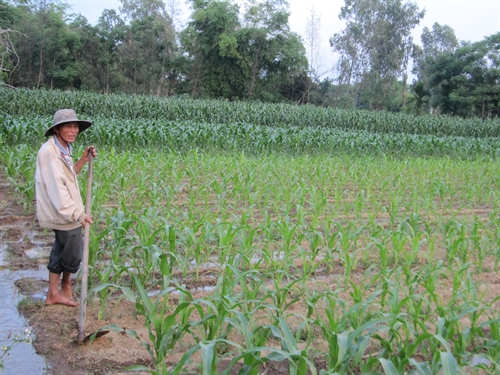 |
| Plants aplenty: A man tends to his corn field along the Thu Bồn River. — VNS Photo Công Thành |
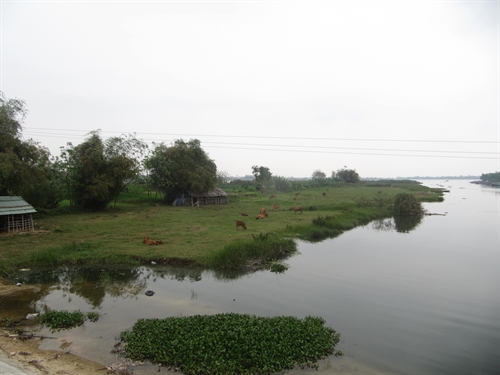 |
| Landscapes: Cows graze alongside the Thu Bồn river in Triêm Tây. — VNS Photo Công Thành |

